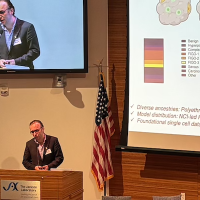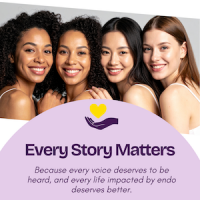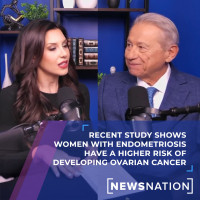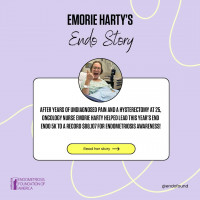PATIENT AWARENESS DAY 2018:
LIVING YOUR BEST LIFE WITH ENDO
Sunday, March 18, 2018, (8am-5pm) Einhorn Auditorium (131 E76th st) at Lenox Hill Hospital, NYC
How Clinical Gender Bias Prevents Diagnosis and Treatment
- Okay let's shake things up, get this room ready. So my name is Meghan Cleary. I am a... See if it got it--oh! All right. So my name is Meghan Cleary. I am a writer, I'm a speaker, a patient advocate. I had a delayed diagnosis of endometriosis for 31 years. And I'm also a DES daughter. My website is bad-periods, you can go there, you can email me for any information that's in this presentation as well as all my sources of where I got my clinical information in this presentation. There's also a lot of information on my website, it's not super well organized, but you will find the answers to everything you could possibly wanna know about endometriosis, I hope.
So I just wanna start my presentation with a quote from an ABC News story in 2011. "The most common way women present "with heart disease is dead on arrival." Now this is a quote from Dr. Kathy Magliato, she's a cardiothoracic surgeon. And what this suggests is that, the major diagnostic tool we have to learn that women have heart disease is death. Yes. So that seems somewhat extreme, doesn't it? So this is an article from 2014, from the New York Times and it's about gender bias in medicine, actually sex bias, is what it's called, because when you study cells, they're either female or male, depending on the biology, and of course, me wanting to be inclusive, I'm gonna be using the words female bodies and women interchangeably in this presentation. I just wanna bring you to Dr. Clayton's quote. "We literally know less about every aspect "of female biology compared to male biology." All right so, what is clinical gender bias? So clinical gender bias is really when you get down to it, it's a way of thinking. And it's a way of thinking about, by healthcare practitioners, doctors, scientists and institutions about female bodies and health. It's a consequence of a lack of studies and clinically evidenced research on female bodies. And it's also, as we heard with Abby Norman's great talk, it's a product of very, very old cultural ideas, myths or other erroneous beliefs about female bodies. And the results of this wonderful stew is with endometriosis is the way diagnoses as well as other diseases, dismissal of symptoms, and then physical and psychological harm for everyone who has heart disease to maternal health and everything in between. So I have a lot of slides about clinical gender bias. And I'm gonna just whiz through these and give you the kind of the top 40 highlights. A really good one is that, from '97 to 2001, eight out of the 10 prescription drugs that were pulled from the market, posed greater health risks for women. One of the most wonderful examples of this is Ambien, a drug that was on the market for 20 years before they halved the dose for women, after having many reports of car accidents. Oh! We're gonna go back a slide, this is a very sensitive clicker. Before 1993, medical studies were not required to be performed on women. 1993, National Institute of Health said, you know what, you need to start doing studies on women. Now keep in mind, National Institute of Health is a governmental body, most research in this country is funded by pharmaceutical companies who are not required to follow this standard. Please go forward. Okay. All right before 2011, nothing was known about how heart attacks presented differently in women. Women are more likely to get inaccurate results from the stress test because all the diagnostics were studied on men. Depression, lung cancer, Alzheimer's, all present differently in women. Ah, it keeps, okay. Before 2008, pregnancy was considered a pre-existing condition and you had to pay extra in your premiums for health insurance, if you thought you might wanna become pregnant. And in 2017, the US had one of the highest rates of maternal mortality in the industrialized world. It's making me cry. With women of color experiencing triple that rate. So wrong. Now we get to pain, one of our favorite things as endo women. Pain is often our major symptom that drives us to go actually seek care from a healthcare provider. It's one of our number one drivers. And pain's actually very different in men and women. But almost all the research in pain is done on male animals. We all know it takes an average of 45 minutes more for a women to be treated, treated for pain in emergency room setting. And the conditions where pain is the only reported symptom, these are ranked much lower on the hierarchy of diagnosis and women are often questioned as patients, does this sound familiar to anyone in this room? Yes. We're gonna do it. Oh! Women also experience really wide disparities in pain care, so it's delays in diagnosis, misdiagnosis, improper and unproven treatments, stigma, neglect, dismissal, do these sound familiar as well? More frequent and severe and longer duration of pain. And my favorite, it's not real, which leads to more frequent mental health diagnoses. Okay. So... This article was written in 2018. Now this jumped out at me because I was reading it and basically women who complain of chest pain are often told they have not had a heart attack if their arteries aren't blocked. But then they went and did a study and found out, many women who have had heart pain and never had blocked arteries had scars proving they had had a heart attack. So too often, the women are told, they don't have a heart problem and they're sent home instead of receiving appropriate medical care. Does this also sound familiar to anyone in this audience? So, this is the general landscape of women's health and what we know about women's bodies. In general, these are common well-known diseases. Heart disease, lung disease, Alzheimer. What happens when we get to periods? Ahh, period problems. Welcome to what I call the gyno ghetto. This is where anything that is associated with a period, that means you may have a disorder that has symptoms that show itself in a period, this is where they live. Now, this could be anything from pelvic pain, endo, fibroids, PCOS, adeno, periods also carry with them, we got cultural stigma, shame, taboo, a lot of women feel like it's their lot in life, there's cultural messages. Women might feel like they did something or they don't do enough or they can solve their own problems, their symptoms. All right and in the gyno ghetto, we have a serious lack of training. Healthcare practitioners don't have the right tools to diagnose and treat these disorders effectively. They don't get disorders that manifest in period symptoms, time and attention, they often dismiss it. It's bad periods. And then when we look at that OB-GYN specialty, they are typically generalists. They don't receive adequate training to identify or remove endo or treat endocrine disorders that manifest with period symptoms. They have a very limited set of tools. The primary surgery they're taught to master in medical school and perform is hysterectomy. And they are actually generalists. They do not perform any one procedure at a high volume. This is very important. When you have a disease that requires surgery or specific treatment, you always go to someone who does that treatment at a very high volume. That's because it's the only thing they do, all day long and patient outcomes are much, much better. If you seek a specialist who has high volume. So they don't do that. They deliver babies, they do well woman exams, they do many different things day to day. They're the only specialty that does this. Okay, so what happens if we don't have any information that's clinically sound and scientifically based on women's female bodies, and we don't have any training for the people who are in charge of helping us care for our bodies, we have a lot of fun things that step into fill the gap here. Number one is myth. And our friend, Hippocrates. Yes, so the very definition of endometriosis is endometrium that has gotten loose. Doesn't that sound familiar to our friend, the wandering womb. The wandering womb that can only be satiated by sex and procreation with a man. Yes. So this, you know, if you think about this, that was from 5th century BC, we are in 2018 and a lot of myths that you hear about pregnancy cures endo, hysterectomy cures endo, uterine lining is wandering about, they sound really familiar. So you think that we may have updated our thinking, but we have not. ACOG has, ACOG is the American College of OB-GYNs, right now their treatment recommendations are, erroneous at best. Their recommendations are burn it, this is for endometriosis. Suppress it, hormones, or remove non-related organs. Just remember endometriosis is not a disease of the uterus. And yet, it's the only disease where removing a non-related organ is considered a treatment. Pharmaceutical companies like to step in and fill that gap. They claim that disease can be completely managed hormonally. Which we know is not true. All hormones of course, are not bad, and you have to choose the treatment that works for you. They might help to manage symptoms. But pharma companies also contribute heavily to ACOG, World Endometriosis Society, and endometriosis non-profits. And all this nice big mix makes a big, fat diagnostic delay of nine to 11 years. I was 31 years. And patients often really suffer. As we all know, when you go in to burn lesions inside someone's pelvis, one of the most densely packed areas of anyone's body with organs, muscles, ligaments, all right close together, you really have a high incidence of necrosis, which is killing cells adjacent to where you made the burning. So a lot of women have a lot of damage on the inside of their bodies, by the recommendations from ACOG. There's also deeply infiltrating endometriosis which has been shown, when you delay diagnosis and give a woman the pill, there's new studies that show that that actually makes the endo grow deeper. And some women have permanent side effects from heavy hitters like Lupron, which can be permanent ovarian failure as well as joint failure and then let's not forget psychological trauma. In my mind, my opinion, this represents mass negligence. On millions of women's bodies in this country and it is protected by what's called the standard of care which is, if you're a doctor, if you do a procedure that your colleagues would do in the same situation, you are protected from medical malpractice. So that's just a little sum-up of our current situation, I know. It's slightly depressing. It's always fun to give the most depressing talk. So, as we know there's no one treatment for endometriosis, but there is a little glimmer of hope on the horizon. That's the World Endometriosis Society Consensus from 2013. It's consensus paper, it actually has far more clinical rigor to it, than the ACOG standards. Comprised of 54 different clinical bodies worldwide. And while the paper isn't perfect, it does offer us two really helpful models, one is the multi-disciplinary model which says that a woman should be in charge of her care. And that she should deploy all these different, different modalities from surgery with obviously high volume, excision surgeon. Perhaps immunologist, psychologist or complementary modalities like acupuncture and Chinese medicine. Diet, lifestyle, massage and patient support. This is really helpful. They also map out for us, center of excellence. What is a center of excellence, they say? They say this is a place that has specific training in endometriosis. So they can identify endometriosis, and remove the endometriosis. Advanced surgeons who know how to handle these deep infiltrating cases. These centers have an access to a non-profit organization with input on behalf of women. Collaborative management and transparent record of outcomes. Very important. Okay. So, just wanna make sure, going back here. Sorry. Okay great. So I'm just gonna go over this real quick. Before treatment when you think about endometriosis and these other disorders, we really have to change our thinking a little bit about what they are. And that means, I need, okay, all right. So I think of endo and adeno and fibroids and PCOS, all in the same family. And they may not even be period problems per se. They may just be disorders that show themselves with symptoms of your period. So endocrine disruption is a big one, we have a lot of endocrine disruptors in our food, air and water that we don't have any control over, also inflammation as Dr. Seckin talked about, there may be autoimmune factors but the reality is, that the pain symptom of women are worth addressing and that it requires a specialist, not our friends, the generalists. So when it comes to making change, there's no one thing that's gonna really move the needle, just like there's no one treatment for endometriosis. So ACOG absolutely must change their guidelines. There is no question about that. They are not based on sound clinical evidence. They do not disclose their conflicts of interest, unlike the World Endometriosis Society that does. Insurance companies must be educated about early diagnosis and the multi-disciplinary model. Insurance companies pay doctors. So, if doctors can't get paid for treating women for this disease, then how are they going to make a living and how are women going to get treated. It's quite the circle. Patients have to change their own thinking about their bodies and demand that people take their symptoms seriously. Clinicians got to start to be open to being educated. I think we've all been there, when we know more about our disease than our doctor. And pharmaceutical companies have got to loosen their grip on this market. All right, so on a personal level, what you can do. Now this is where sort of things get hopeful, people. So the most important thing is, you need to translate your symptoms into clinical data. What does that mean? You need to get very familiar with your pain. You need to look up pain vocabulary words so you can describe your pain. Learn the names of your body parts, so you can say where your pain is and you need to write it all down. And when you go into your healthcare practitioner, this is the one biggest tip I can leave you with today. You write all that down and you print it out, a copy for them and a copy for you. And you insist this information is put into your electronic medical record. Why is that? Because if you have a healthcare provider, who is a generalist, who has not been trained, to diagnose your disease, has not been trained to treat your disease and may have some clinical bias thinking of themselves, what do you think that your medical record is going to look like? It's going to be all filtered through that lens. And I have read many, many medical records where I know the patient and I see what's written down in their medical record, and it's a very different story. Only work with practitioners that are gonna validate your symptoms. And if it doesn't feel right to you or you feel like you're getting harmed, stop doing it. You gonna have to educate yourself, your healthcare providers and always, always follow your intuition on what is right for your body. And the biggest thing I've been learning in my year and a half from being diagnosed, it's a small portion of my entire life is that I really try to practice a lot of self-compassion with my body and know that my body is trying to heal itself. Even though the symptoms that it's displaying may be maladaptive. All right, so if you wanna get active, get a little crazy and get out your phone right now and email these fine people at ACOG, these are all their email addresses. And you can say, I would like you to change your guidelines and update your guidelines. Of course you can email me for this, I'll send you all this. You can contact Planned Parenthood. Why do they not put their weight and their muscle and their legal muscle around addressing these reproductive disorders. You can contact your state medical board, you can email the insurance commissioner in your state. Especially if your insurance is not gonna pay for your surgery. And if you think that you've been the victim of negligence, which I can guess, most of us here have been if we saw a regular OB-GYN to treat our disease, you can email Tom Wagner. He's in charge of ethics at American Medical Association. There's his email. Hi Tom. So the biggest thing you can do is really, is change your thinking. Your body is worth the right care, your symptoms are worth addressing. Your quality of life is important. There's no one solution to managing endo, I wish it was like we could have a surgery and we could eat kale and life would be grand but you gotta put it all together and you gotta be the one to drive it. It's gonna be a combination of all of those things. We need thriving healthy women to meet the demands of our times. And I know, from personal experience, how exhausting it is to have endometriosis, the pain, the fatigue, getting heard, so just remember you don't have to be political to make change. Every time you take your own symptoms seriously and you insist that the healthcare providers in charge of helping you take your symptoms seriously, you are making it better for the next woman who comes along. And so, that is the conclusion to my talk but I just forgot to thank everyone for coming out today and thanking Dr. Seckin for putting on this event and live-streaming it and the Endometriosis Foundation of America and the tireless staff, you guys have worked so hard to make this amazing. And just want to leave you with really the importance of taking yourself seriously. So I hope that was helpful and please feel free to email me, contact me on my website. I'm happy to share any of this information with you.










